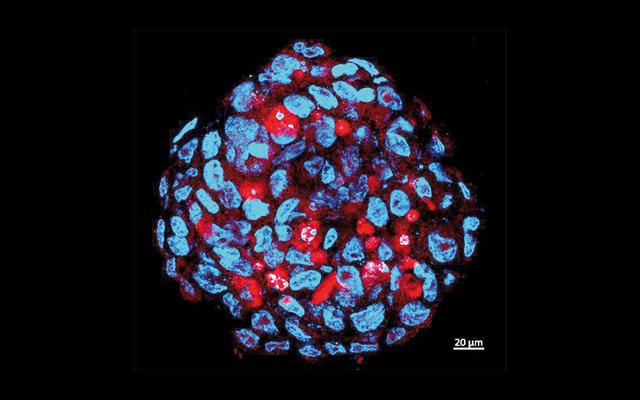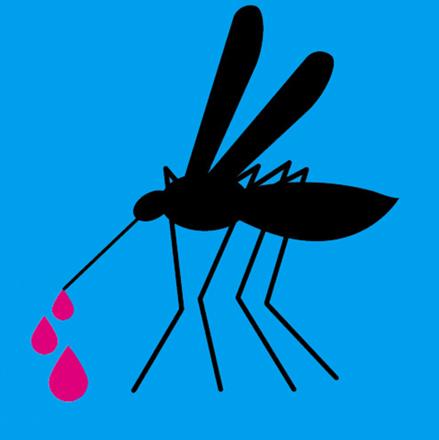You are here
Scientists report cancer-killing potential of Zika virus
By Orlando Sentinel (TNS) - Aug 01,2018 - Last updated at Aug 01,2018

Tumour sphere comprised of human medulloblastoma stem cells infected by Zika (red) (Photo courtesy of genengnews.com)
ORLANDO, Florida — Dr Kenneth Alexander was driving home one day last year when he thought of the idea: What if the Zika virus could be used to kill a childhood cancer called neuroblastoma?
The Zika outbreak was in its third year and scientists had learned that the virus damages the nervous systems of unborn babies by destroying the developing nerve cells.
Those developing nerve cells also make up neuroblastomas.
So, Alexander, chief of the Division of Infectious Diseases at Nemours Children’s Hospital, started brainstorming with a surgeon colleague and brought on board Dr Griffith Parks, a University of Central Florida scientist who has been studying Zika.
After nearly year of research, the team published the preliminary results of their first study, showing that neuroblastoma cells that were exposed to the Zika virus in the laboratory died 10 days after being infected, making the virus a potential treatment for the cancer.
The team’s findings have been published in PLOS One.
“This is like all good ideas. It’s early and there may be a fly in the ointment,” Alexander said in an interview on Wednesday. “But at this point things are looking promising. The path ahead is there and we hope to get lots of other people interested in this research.”
Neuroblastoma is the cancer of nerve cells that reside outside of the brain. It is the second most common types of childhood cancer and has a disproportionately high mortality rate compared to other childhood cancers. It mostly affects infants and children under age 5.
Treatment usually involves surgery, chemotherapy or radiation, or a combination in high-risk cases. In some cases, none of the treatments work.
“There’s a lot of research on neuroblastoma, but we wanted to take a different approach [to finding a treatment],” said study co-author Dr Tamarah Westmoreland, a pediatric general and thoracic surgeon at Nemours. “I think Zika is holding great promise. In looking at these results, we think it can be used [along with] current therapies. However, we’re very early in this research.”
The Orlando team is not the first to look at cancer-killing potential of Zika.
Several groups, including one in the US and one in Brazil, have shown in preliminary studies that Zika infection killed glioblastoma cells in the adult brain, potentially opening new doors for treating this aggressive and common type of brain cancer.
Another Brazilian group reported in June that a Zika virus strain killed aggressive cancerous tumours of the central nervous system.
Alexander said what’s unique about his team’s research is identification of a surface protein called CD24.
The protein makes cancer cells susceptible to being killed by the Zika virus. Cancer cells that did not have the CD24 protein did not respond to Zika, Alexander’s team found in their laboratory research.
“So with these findings, we can ask what other cancers express CD24,” said Alexander. “Now we’re beginning to look at other cancer cells that express CD24 to see if we can kill them as well.”
Scientists do not fully know how the virus enters and destroys the cells. There may be proteins in addition to CD24 that make a cell susceptible to Zika.
“But at least we’ve gotten part of the story,” said Alexander.
This is not the first time a virus has been used to treat cancer, the history of which dates back to the 1940s. More recently, a modified form of herpes virus has been used to treat melanoma.
Alexander said that, based on his team’s preliminary findings, the Zika virus will not have to be modified from its natural form, because fully grown nerve cells are immune to the virus.
“We’ve got this fortuitous situation, where the virus can make a subset of people really sick. But for the majority of us, it’s a non-serious infection,” he said.
Most children and adults who are infected with the virus do not develop any symptoms or have a mild cold-like reaction.
Alexander said the potential therapy could be an injection, much like how mosquitoes infect humans. Or an injection to the site of an excised tumour to prevent the return of the cancer.
The team is now taking the research out of Petri dishes and into rodents.
Alexander and Parks, interim associate dean of research and director of Burnett School of Biomedical Sciences, are also planning to study how the CD24 interacts with the Zika virus.
Related Articles
BALTIMORE — When scientists in Brazil suspected a link between a troubling upswing in a birth defect called microcephaly and the mosquito-bo
MONTEVIDEO — South American health ministers held an emergency meeting Wednesday on slowing the spread of the Zika virus, dubbed a "nightmar
Botox has frozen the faces of countless Hollywood stars, and international researchers recently said the toxic injections might also be able to stop cancer in its tracks, at least temporarily.














